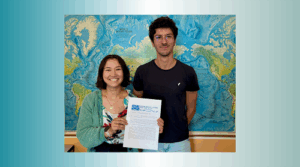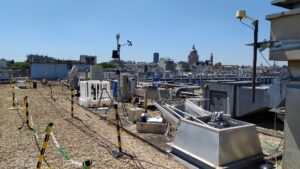CDD
Post-doctoral researcher in ERC project FLORA
Contexte
École Normale Supérieure (ENS)
Founded in 1794, the École Normale Supérieure (ENS) is a higher education and research establishment whose activity covers most scientific and literary disciplines. An elite establishment which recruits the very best students in France and abroad, via the system of competitions and preparatory classes, but also by selection on application and interview, the ENS enjoys great international prestige through the quality of its students but also by the reputation of its research centers, in particular in mathematics, physics, biology, cognitive sciences, philosophy, and sciences of antiquity. The School has 37 joint research units.
The École Normale Supérieure is a member of PSL University (Paris Sciences et Lettres).
Description
This postdoctoral research position is part of the FLORA project (« Sustainable and healthy food solutions: system dynamics and trade-offs »), funded by the European Research Council (ERC) and led by Carole Dalin, in the Geosciences Department of the École normale supérieure (ENS), in the centre of Paris.
The selected candidate will join the FLORA research team for 2 years (with possible extension), collaborating with Dr Dalin and other doctoral and postdoctoral researchers in the team, department and beyond, to answer the project’s first main research question: “How far are current global food systems from environmental sustainability and health goals?”.
About the FLORA project
Food systems are crucial to end hunger, but also to mitigate and adapt to climate change, to protect and restore biodiversity, to ensure human health and well-being, to end poverty, and to support sustainable communities. While hunger has receded, food systems are causing increasingly severe damage to our environment and health. The FLORA project will contribute to a transformation of global agri-food production, trade, and consumption necessary to achieve sustainable and healthy food systems.
The project will create essential evidence to identify and implement the shifts in practices and behaviours needed to effectively achieve this transformation, by (1) making a diagnosis of the integrated health and environmental outcomes of food systems globally, from the production and consumption perspectives, with innovative measures of sustainability, (2) identifying key threats and opportunities with system dynamics and complex network analyses, and (3) targeting and evaluating tailored solutions with an inter-disciplinary modelling framework.
The project will enable the identification of most effective, targeted solutions by considering trade-offs, synergies, and dynamics of key food systems components. Global in scope, it sets the ambitious goal to overcome barriers in current approaches by taking a systemic approach and establishing a robust, interdisciplinary framework supported by empirical advancements to tackle complex food systems challenges.
Missions and activities
Main missions
The key research objectives for the selected candidate are listed below, with some flexibility to explore further specific aspect(s) depending on the candidate’s skills and interests:
- developing and quantifying an integrated indicator of environmental sustainability and nutrition security of food worldwide, from the consumption and production perspectives, for a reference time period
- carrying out the extension of this indicator over time using emerging datasets
The first objective builds upon work from Dalin’s team covering impacts of crop and livestock production worldwide on climate change via greenhouse gas emissions; water stress via withdrawals from soil, surface water and groundwater for irrigation; and both aquatic and terrestrial biodiversity via the use of farming inputs (fertilisers) and land, respectively. This is done at a high spatial resolution of approximatively 10km x 10 km across the globe (5arc min).
Here there is potential to expand this to cover fisheries including fish feed and their environmental impacts.
In addition, the selected candidate will use international food trade data to understand these impacts with a consumption based-perspective.
Finally, the selected candidate will use nutritional data and develop metrics to build the human health dimension of the indicator; considering the balance and adequacy of available nutrients for human consumption in countries’ food supply, food affordability and good accessibility.
The second objective will be to use emerging global spatial datasets available over time to extend the quantification of the indicator over 2 to 3 historical decades.
Main activities
- Research : data collection and analysis, modelling, publishing results in high-quality peer-reviewed articles
- Presenting results at scientific conferences
- Attending the lab activities such as seminars and relevant workshops
Work environment
The selected candidate will mainly interact with researchers and students from the two laboratories at the Department of Geosciences at ENS: Dynamic Meteorology Lab (LMD-IPSL) and Geology Lab (LG ENS), as well as with the Centre on Environment and Society at ENS (CERES).
Both LMD and LG ENS labs are parts of the interdisciplinary research federation Institut Pierre-Simon Laplace (IPSL); a unique place for scientific exchange at the intersection of many areas of expertise in environment.
Additional Information
Benefits
37h30min working week; 49 days off per year.
Work location: 24 rue Lhomond 75005 Paris, France.
Partial remote working possible with prior approval.
- ENS Researcher contract for 2 years, renewable up to 3 years
- Access to Resources of ENS and PSL University
- Budget available for IT equipment
- Budget available for research activities, such as research collaborations, conferences and open-access publications
- Compensation based on ENS salary scales and candidate’s experience, starting at approximately 36.000 euros annual gross salary
- ENS employee benefits – including health insurance, retirement benefits, subsidised work transportation (bicycle, public transit, car) & work meals
How to apply
Please send an email to , with the subject «Application for FLORA Postdoc 1 – Your last Name » and the following attachments as PDF documents:
- your CV including research manuscripts or publications
- a statement of research interests and evidencing how you qualify for the project and position (see Skills/Qualifications section)
- name and contact information of three professional references.
Pre-selected candidates will be invited to an interview.
Additional comments
ENS is an equal opportunity employer. We are committed to building an inclusive and diverse research community and we encourage applications by members of all underrepresented groups.
Please send any questions you have on the position to Carole Dalin
Compétences requises
Degree
Ph.D. in in any scientific or engineering discipline with a grounding in earth and environmental science, agriculture, hydrology, ecology or related field.
Work experience
Publication record in peer-reviewed scientific journals commensurate with career stage; quantitative and modelling research experience.
Skills/Qualifications
Technical skills
Essential
- Computer programming (e.g. Matlab, R, Python)
- Analysis of large (spatial) datasets
- Knowledge of environmental science
Preferred
- Environmental Impact Assessment (e.g. water resources, climate, biodiversity)
- Analysis of large-scale agricultural and trade datasets
- Experience with source control (GitHub)
- Knowledge of food/nutrition security metrics
Behavioural skills
- Evidence of ability to work well in a team as well as independently
- Commitment to a collegial and inclusive workplace






